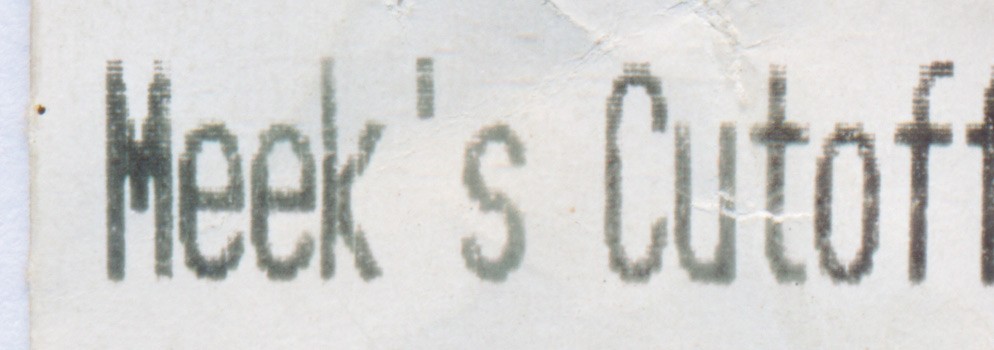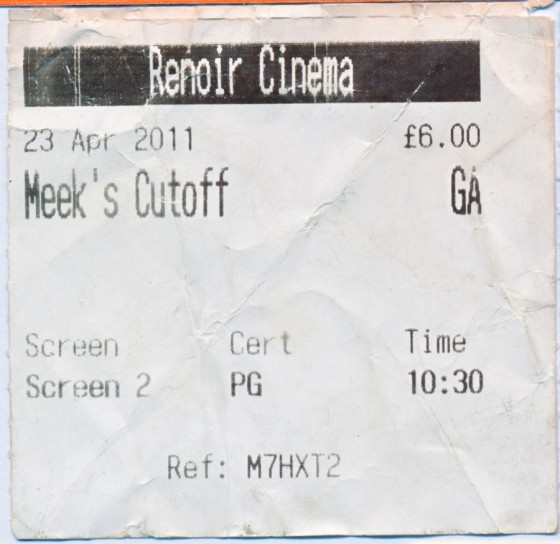Meek's Cutoff

The first fourteenth movie of the year.
How dare they?
As previously outlined, the first film of the year is crucial. Whatever you see in the first week of January determines the character of the films of the coming year. If it’s Cabin Boy, you will have a year of Quiz Show’s and Pulp Fiction‘s. The inverse is also true: a year that begins with Darkness bodes films such as Red Dragon, Insomnia, and (shudder) 28 Days Later (I know, it is strange that I don’t like boring films by wildly overrated directors: see moral relativism, below).

Now as any critic will tell you, January is a dumping ground, the time after Oscar consideration where the studios jettison that which they intend to write off. This presents little problem for me as 1) I like everything, 2) I see everything and 3) I live in the UK now, and so the quality of films in January is completely random. My January, for example, could be your Christmas (the all-English cast, shot and financed King’s Speech came out here in February). It could your next year (which is why we got Taken before you…figuratively!). It could also be your never (we got the mediocre John Carpenter’s The Ward, his first film in 10 years, and the truly excellent Triangle, both American, neither of which came out in the US, and both of which played my new favo(u)rite theater(re): Cineworld Crawley (Ye Olde)). It may just be St. George’s day where we all get drunk and dress up in sheets with haphazardly painted red crosses and roam the streets looking for Cromwellians. And then see Hop.
Sadly, things are getting ‘better’, and studios are trying to get movies out faster. Gone are the days when Star Wars came out six months later in England (not sure which part of that sentence our modern sensibility is less familiar with: ‘Star Wars’ or ‘later’). In any case, films now can come out at…the same time, and consequently, the first film of the year was The Green Hornet.
Curse you post-Bayesian globalization-intensive international distribution model!
What does Green Hornet tell us, aside from you are getting sleepy, very sleepy? That we will get films that should be good, but aren’t. Everything about The Green Hornet, its ill-conceived attachment to, well, racist, source material, its haphazard story, its reliance on long, long improvisation and its wildly inappropriate casting tells us it should be great. And for some reason, or, possibly, for all the reasons listed above, it is not. Which leads us as it does to Meek’s Cutoff.
If my hatred of human beings makes be a bad person...oh, come on: I was headed to that sentence two paragraphs back.
First of all, you may be wondering, why Meek’s Cutoff? Let me answer your question with a question (‘huh?’), then an exclamation: (‘boo!’), followed by a statement: our estimable Ms. Kelly Reichardt had previously made Wendy and Lucy, which I never saw. A ha, you say, that explains it! Well, it should, because you know about The Hindenburg rule. I have a few rules about what makes me see a movie (or rather, I have so many that I will see anything), but one rule about why I won’t see a movie, called The Hindenburg rule. At the end this film (in the theater, by the way), the photos of the various characters come across the screen with an ominous narrator intoning the names of those who lived and died. Ah, the 1970s; if you ran out of money, you just threw together a quick end title sequence. Times sure have changed, haven’t they, The Last Airbender?
They sure have.
Anyway, after we hear ‘Herr Schwietzerkurstenburg: died’ and ‘mime-y guy from Hogan’s Heroes: survived’, we are treated to, garnering the largest cheers in the theatre: ‘Dog: Survived’. Dog violence is not acceptable to me. I haven’t seen, nor will ever see, Amores Perros, or Year of the Dog or Marley & Me. Doggies live forever and are never hurt. That’s the reality, and I won’t have films spoiling it.
The exception to this is the Road Warrior rule, and not just because The Road Warrior is such a great film. The dog dies, yes, but he is avenged, as is appropriate, by disproportionately brutal violence. If my hatred of human beings makes be a bad person…oh, come on: I was headed to that sentence two paragraphs back. So MPAA, instead the extremely strange ‘some sci-fi violence’ that characterizes your warnings to parents (as opposed to the ‘fi’ kind I suppose), please add: doggie violence (unavenged) and doggie violence (answered with prolonged evisceration). Which would, naturally enough, be a ‘G’.
So the timeline is as follows: I didn’t see Wendy and Lucy because a doggie might die, then I found out the doggie didn’t die, so I wanted to see it, but hadn’t, but assumed it would be good because the doggie didn’t die so I saw her other movie. Come on, it makes a lot more sense than reading reviews. Had I done so, I think I would have avoided said cutoff as it had the same inexplicably high rating as Star Trek.
Under no conditions get me started on Star Trek.
Star Trek aside, we have all by now realized, there’s no such thing as ‘good’ or ‘bad’. Some people decry moral relativism, what with all those millions, you know, dying from just wars and stuff, but I just can’t get enough of it (not the dying, the relativism). Otherwise why would they have made, and then, released, John Carpenter’s The Ward? So Meek’s Cutoff, is it a good movie, a bad movie, or is that merely a subjective judgement? Who can say? The answer is me, and that Meek’s Cutoff is terrible.

One should have known: the ill-named Renoir cinema does not sell chocolate. Jean Renoir would be spinning in his turbiner.
Which gets us back to a variation of the first question: why would Meek’s Cutoff be the film that gets me back to writing this damn blog two years later, after I had stopped, not unironically after my beloved dog Velma died. What funny things can you say about a movie where the characters spend the whole time looking for water and whose twist is that they’re still looking for water at the end. Okay I’m making it sound way funnier than it is. And I guess that’s the point. I miss telling myself jokes. I am fortunate to be my own biggest fan; you, possibly less so.
But why shouldn’t it be a comedy; you’ve got the crazy titular guy who’s lying about knowing the Oregon territory and getting the settlers lost, and yet strangely, and awkwardly, staying with them, the endless scenes of walking through flat terrain (‘Look, ma: a hill!’ – actually, that was a line in the film, which, again, I’m making sound more interesting than it was). A women crazy from ‘mountain fever’ screaming about the invisible Indians following them around. Comedy gold! If you make a movie that begins with people lost and looking for water, and ends with them lost and looking for water, that’s a comedy. Just ask Samuel Beckett.
Just ask Sherwood Schwartz.
Instead we get a movie that is so desperate to tell us how grubby and dull life is when compared to the narrative excitement of the ‘Western’ (‘these sites seems so desperately random, like the elaboration of a bad liar. P.S. There won’t be anymore Silence of the Lambs references in this article, so don’t bother looking’). We are treated to endless scenes of walking, moving rocks, fixing wheels, and walking some more (again, way funnier in the description). The film seems to be saying, and the critics so gratefully agree: movies are more interesting than life. How dare they?
But you know what? Movies aren’t boring, and neither is life. And I can prove it: I made Meek’s Cutoff into a comedy.
-$4.50
The Lonely Comments Section

 [logo]
[logo]